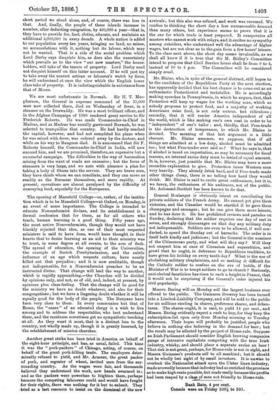Another great strike has been tried in America on behalf
of the eight-hour principle, and has, as usual, failed. This time it was the " pork-packers " of Chicago, acting, of course, on behalf of the great pork-killing trade. The employers deter- minedly refused to yield, and Mr. Armour, the great packer of pork, and register of wheat, invited men from the sur- rounding country. As the wages were fair, and thousands believed they understood the work, new hands swarmed in; and as the packers were powerless to frighten them, perhaps because the competing labourers could and would have fought for their rights, there was nothing for it but to submit. They -tried as a last resource to insist on the dismissal of the new arrivals ; but this also was refused, and work was resumed. We confess to thinking the short day a less unreasonable demand than many others, but experience seems to prove that it is the one for which trade is least prepared. It exasperates all masters who cannot work with relays, and it excites no sympathy among outsiders, who understand well the advantage of higher wages, but are not clear as to the gain from a few hours' leisure. To the class next above, the short day seems invaluable, as we shall all know if it is true that Sir M. Ridley's Committee intend to propose that Civil Service hours shall be from 9 to 4, instead of 10 to 4 p.m. The Committee will be considered simply cruel.


































 Previous page
Previous page